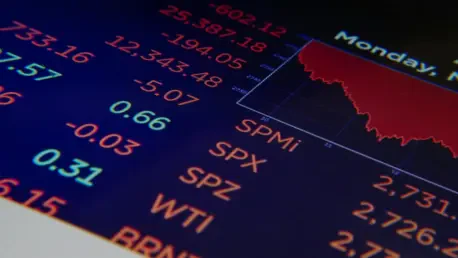In a groundbreaking moment for Ukraine’s corporate landscape, Kyivstar Group became the first Ukrainian company to list on the Nasdaq in August, achieving a valuation of $2.3 billion and capturing the attention of global investors. This historic debut is far more than a financial milestone; it serves as a critical gauge of how markets assess the balance between high-growth opportunities and the stark geopolitical risks inherent in emerging regions like Ukraine. As a leading telecom provider, Kyivstar’s entry into the U.S. stock exchange unfolds against the backdrop of ongoing conflict and ambitious reconstruction plans, offering a unique perspective on investor sentiment. The event raises pivotal questions about the appetite for risk in unstable environments and whether the promise of digital transformation can outweigh the uncertainties of war. This development sets the stage for a deeper exploration of how strategic alignments, geopolitical dynamics, and market trends intersect in shaping Kyivstar’s path forward.
Western Ties and Strategic Positioning
Kyivstar’s choice to list on a U.S. exchange, bypassing European markets, reflects a deliberate strategy to align with Western economic frameworks and draw in substantial international capital for Ukraine’s recovery. This move is reinforced by high-profile partnerships, such as the collaboration with Elon Musk’s Starlink, which enhances Kyivstar’s technological capabilities and global appeal. Additionally, the appointment of former U.S. Secretary of State Mike Pompeo to its board underscores a clear intent to integrate with Western political and economic interests. These actions are not merely symbolic; they position Kyivstar as a central figure in Ukraine’s broader push for reconstruction and modernization, signaling to investors a commitment to stability and growth through global alliances.
Beyond partnerships, this strategic alignment serves as a beacon for Ukraine’s aspirations to integrate more deeply with Western markets and values during a time of national crisis. By establishing itself on the Nasdaq, Kyivstar aims to tap into a pool of investors who view the company as a conduit for supporting Ukraine’s economic revival. The telecom giant’s efforts to build trust through such high-level connections suggest a calculated bid to offset the inherent risks tied to its homeland’s geopolitical challenges. This positioning could potentially redefine how emerging market companies leverage international relationships to bolster investor confidence and secure funding for critical infrastructure projects amidst uncertainty.
Navigating Geopolitical Challenges and Opportunities
The shadow of the Russia-Ukraine conflict looms large over Kyivstar’s market performance, creating a complex landscape of both peril and potential for the telecom leader. Should a ceasefire materialize, the demand for digital services could skyrocket as part of Ukraine’s staggering $500 billion reconstruction agenda, placing Kyivstar at the forefront of this transformative wave. Such an outcome would likely amplify the company’s role in connecting communities and powering economic recovery through its extensive mobile and broadband networks. However, the flip side remains daunting—ongoing hostilities pose a direct threat to the company’s infrastructure, particularly in conflict zones where physical assets are vulnerable. This precarious balance epitomizes the high-stakes environment that investors must navigate when considering opportunities in regions marked by political instability.
Emerging markets often present this dual nature of risk and reward, and Kyivstar’s situation is a textbook case of how geopolitical events can sway corporate fortunes overnight. The uncertainty surrounding peace negotiations adds a layer of volatility that can deter cautious investors while simultaneously attracting those with a higher tolerance for risk, drawn by the prospect of outsized returns. The company’s ability to maintain operational stability amidst such turbulence will be crucial in shaping market perceptions. This dynamic also mirrors broader trends in similar regions, where the allure of growth is frequently tempered by the specter of unrest, forcing stakeholders to weigh immediate dangers against long-term potential gains in a constantly shifting landscape.
Investor Sentiment and Market Reactions
Kyivstar’s initial performance on the Nasdaq has painted a picture of mixed investor sentiment, oscillating between caution and a cautious optimism about Ukraine’s future. A notable 14% decline on the first day of trading sent ripples of concern through the market, highlighting the immediate apprehensions tied to geopolitical risks. Yet, the relatively low redemption rate of 25.4% during its SPAC merger with Cohen Circle Acquisition Corp., coupled with $178 million in proceeds, points to robust institutional support from major players like Helikon and Clearline. This backing suggests that despite early setbacks, many investors are willing to look beyond short-term fluctuations and invest in the narrative of Ukraine’s eventual recovery, viewing Kyivstar as a pivotal piece of that puzzle.
Further evidence of this optimism can be seen in the broader market trends, with Ukraine-linked stocks posting a 32% year-to-date increase, reflecting a growing belief in a post-conflict economic rebound. The sharp 17% rebound in Kyivstar’s stock price on the second trading day further underscores the volatility driven by geopolitical news, yet also indicates a segment of the market ready to capitalize on perceived undervaluation. These price swings highlight the delicate balance investors must strike, weighing immediate risks against the potential for significant returns should stability return. This pattern of sentiment reveals a market increasingly attuned to the long-term prospects of regions in transition, even as it grapples with the unpredictability of current events.
Telecom’s Role in Emerging Market Growth
Kyivstar stands as a compelling example of how telecom companies can anchor economic rebuilding in emerging markets, particularly in a nation poised for digital transformation like Ukraine. With a customer base of 23 million mobile users and 1.1 million broadband subscribers, alongside innovative AI-driven enterprise solutions, the company is well-placed to drive connectivity and economic activity in a post-conflict scenario. Its extensive reach positions it as a vital enabler of both personal communication and business operations, critical components of any reconstruction effort. As digital infrastructure becomes a cornerstone of national recovery, Kyivstar’s multifaceted portfolio could see it benefiting immensely from increased demand across various sectors, cementing its importance in Ukraine’s future.
However, the volatile stock performance following its Nasdaq debut serves as a reminder of the inherent risks in such investments, prompting a need for strategic risk management among stakeholders. Diversifying across other emerging market telecoms, such as India’s Jio or Nigeria’s MTN, could provide a buffer against localized disruptions while still capturing growth in similar high-potential regions. Kyivstar’s journey offers valuable insights into how telecom investments can catalyze development in unstable areas, but also underscores the importance of a balanced approach to mitigate the impact of sudden geopolitical shifts. This model highlights the broader potential for telecoms to act as engines of progress, provided investors remain vigilant and adaptable to the unique challenges of each market.
Reflecting on a Historic Market Moment
Looking back, Kyivstar Group’s Nasdaq listing emerged as a defining event that illuminated the intricate dance between conflict, capital markets, and connectivity in a nation striving for renewal. The sharp fluctuations in its stock price during those initial days captured the market’s uncertainty, while strong institutional support hinted at a deeper faith in Ukraine’s resilience. This debut tested the boundaries of investor tolerance for geopolitical risk, revealing both the allure of untapped growth and the ever-present threat of instability. For those who took the plunge, Kyivstar symbolized a courageous wager on a brighter future. Moving forward, monitoring peace negotiations and technological advancements like satellite integration could offer critical insights for navigating similar investments. As the ticker “KYIV” traded through turbulent waters, it stood as a testament to the enduring hope for transformation in emerging markets, urging investors to balance bold optimism with prudent strategies.









